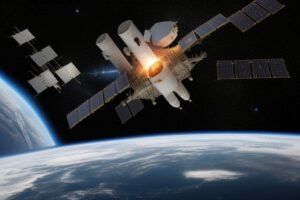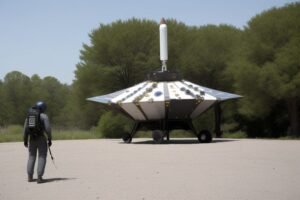Artificial Intelligence (AI) is revolutionizing the field of space travel and exploration, introducing unprecedented efficiency, automation, and precision. From spacecraft navigation to data analysis and beyond, AI technologies are proving to be indispensable tools in the modern era of space missions.
AI’s Role in Space Missions
AI’s application in space exploration is vast and varied, enhancing both the scope and scale of what can be achieved.
Autonomous Navigation and Operations
AI systems enable spacecraft and rovers to perform complex navigation tasks autonomously. This capability is critical in environments where time delays make real-time control from Earth impractical. For instance, NASA’s Perseverance rover uses AI to navigate the Martian landscape, making decisions on the go to avoid obstacles and find the most efficient paths.
Data Processing and Analysis
Space missions generate enormous amounts of data that AI can process at speeds far beyond human capabilities. AI algorithms analyze images and sensor data to identify geological features, atmospheric conditions, and potential signs of life. This rapid processing allows scientists to make quicker, more informed decisions about mission directions and priorities.
Technological Innovations Driven by AI
The integration of AI into space technology has led to several innovations that are changing the landscape of space exploration.
- Machine Learning Algorithms: These are used to predict system failures, analyze cosmic phenomena, and simulate complex scenarios that help improve the design and resilience of spacecraft and missions.
- AI-optimized Communication: AI enhances the efficiency of space communication systems, managing and routing communications to minimize delays and maximize the bandwidth available across vast distances.
- Robotic Assistance: AI-driven robots perform tasks too dangerous or routine for astronauts, such as spacewalks for repairs or the construction of habitats on other planets.
Challenges and Solutions
While AI presents significant advantages, it also poses unique challenges in the context of space exploration.
- Reliability and Safety: AI systems must be extremely reliable and safe, as failure could jeopardize entire missions. Rigorous testing and redundancy are critical components of AI system design for space applications.
- Ethical and Control Issues: The increasing autonomy of AI systems raises ethical questions about control and decision-making in critical scenarios, particularly in relation to crewed missions.
Future of AI in Space Exploration
The future of AI in space exploration is promising, with several potential developments on the horizon:
- Advanced AI for Interplanetary Travel: AI could manage the complex operations of future manned missions to Mars, including life support systems, onboard medical diagnostics, and psychological support.
- Deep Space Communication Networks: AI could autonomously manage networks of satellites around other planets, facilitating better communication systems for both robotic and human missions.
- Exoplanet Research: AI techniques could vastly accelerate the detection and analysis of exoplanets, aiding in the search for habitable planets and extraterrestrial life by analyzing data from telescopes and space observatories.
Conclusion
AI is not just a supplementary technology in space travel and exploration; it is becoming a fundamental component that permeates all aspects of mission planning, execution, and analysis. As AI technology continues to advance, its role in space exploration is set to increase, promising to unlock new mysteries of the cosmos while making space travel safer and more efficient. The integration of AI into space exploration not only pushes the boundaries of what is possible in scientific terms but also challenges us to think creatively about the future role of machines in the final frontier.




















+ There are no comments
Add yours